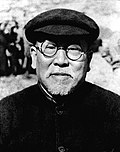Head of Chinese judiciary
| President of the Supreme People's Court Chief Justice of the People's Republic of China | |
|---|---|
| 中华人民共和国最高人民法院院长 中华人民共和国首席大法官 | |
 Emblem of the Supreme People's Court | |
| Supreme People's Court | |
| Status | Deputy national-level official |
| Member of | Supreme People's Court |
| Reports to | National People's Congress and its Standing Committee |
| Seat | Beijing |
| Nominator | Presidium of the National People's Congress |
| Appointer | National People's Congress |
| Term length | Five years, renewable once consecutively |
| Constituting instrument | Constitution of China |
| Formation | 1 October 1949;76 years ago (1949-10-01) |
| First holder | Shen Junru |
| Deputy | Vice President of the Supreme People's Court |
| Website | www |
| President of the Supreme People's Court | |||||||
|---|---|---|---|---|---|---|---|
| Simplified Chinese | 中华人民共和国最高人民法院院长 | ||||||
| Traditional Chinese | 中華人民共和國最高人民法院院長 | ||||||
| |||||||
| Chief Justice of the People's Republic of China | |||||||
| Simplified Chinese | 中华人民共和国首席大法官 | ||||||
| Traditional Chinese | 中華人民共和國首席大法官 | ||||||
| |||||||
The president of the Supreme People's Court is the head of the Supreme People's Court and is the highest-ranking official in the judiciary of China. The office is also legally titled the Chief Justice of the People's Republic of China.
Contents
Under the current constitution, the president of the SPC is appointed by and serves at the pleasure of the National People's Congress (NPC), the legislature. The incumbent president of the Supreme People's Court is Zhang Jun, who took office on 11 March 2023.









